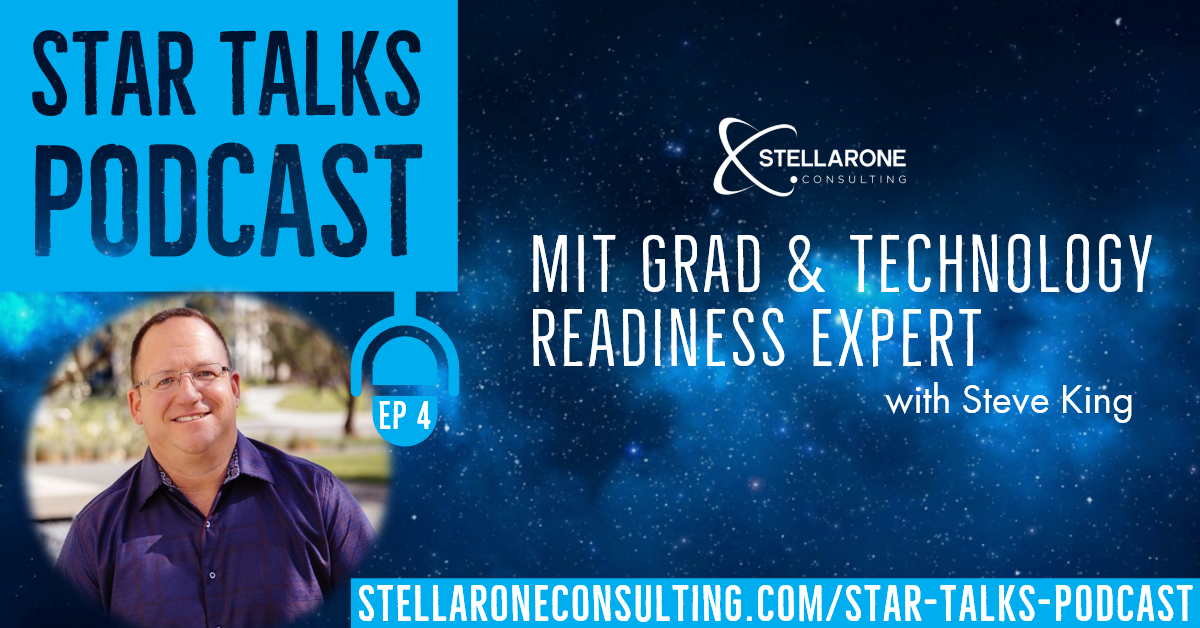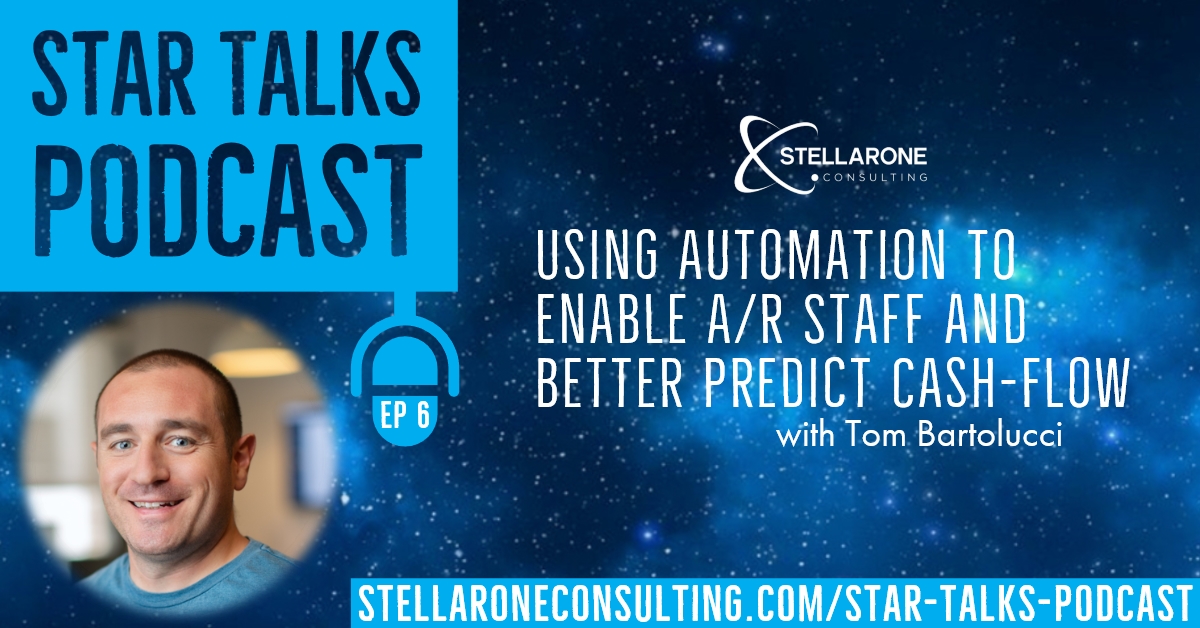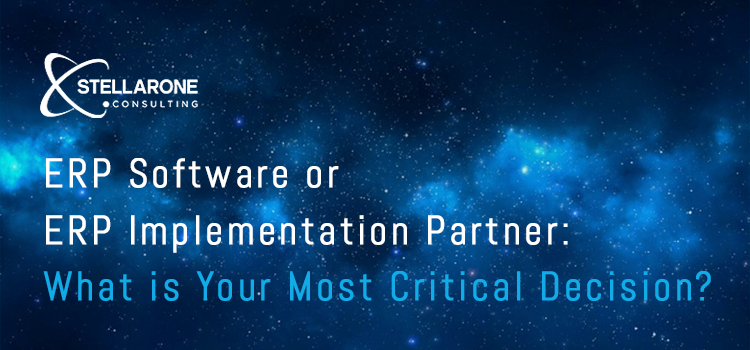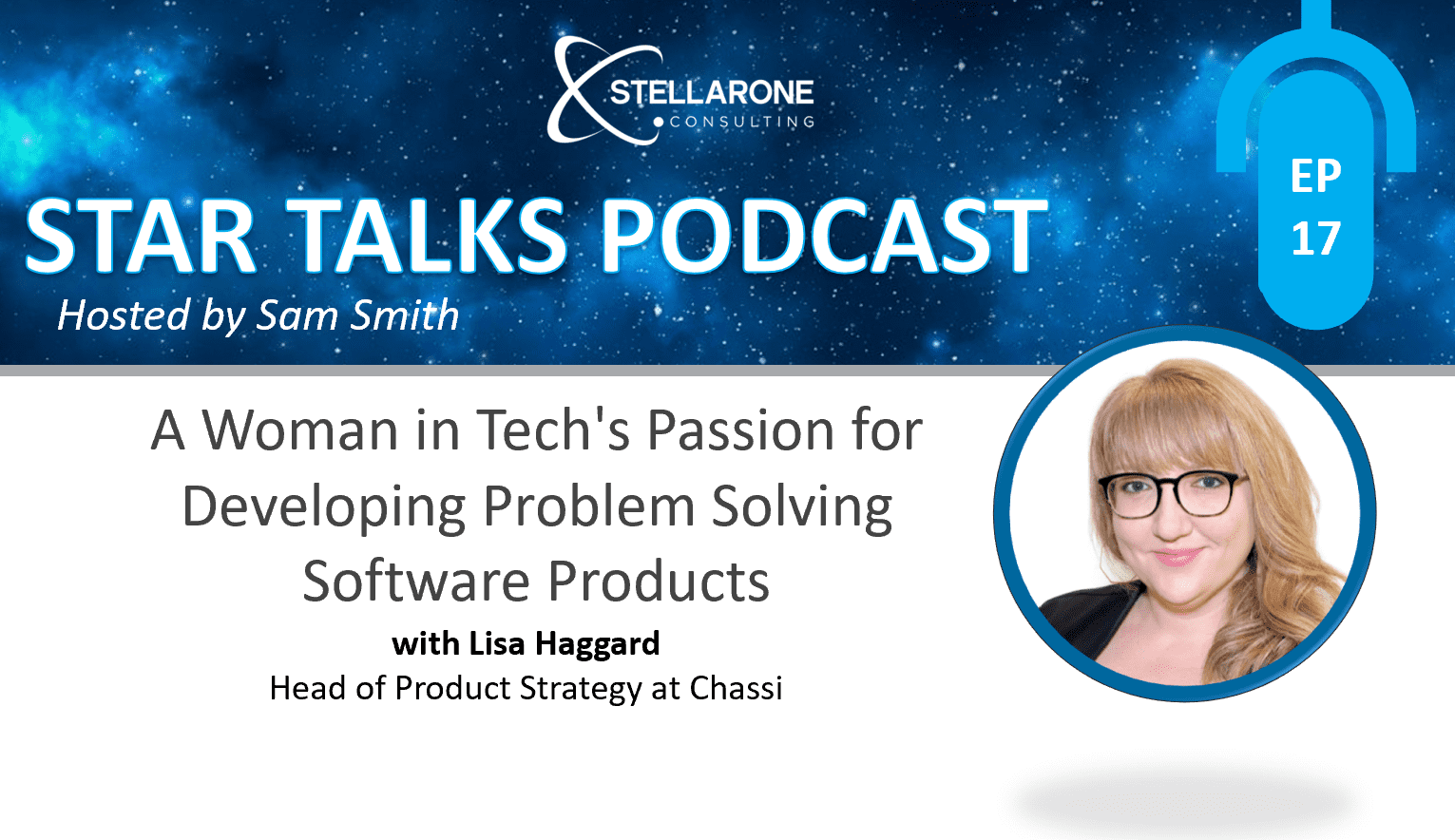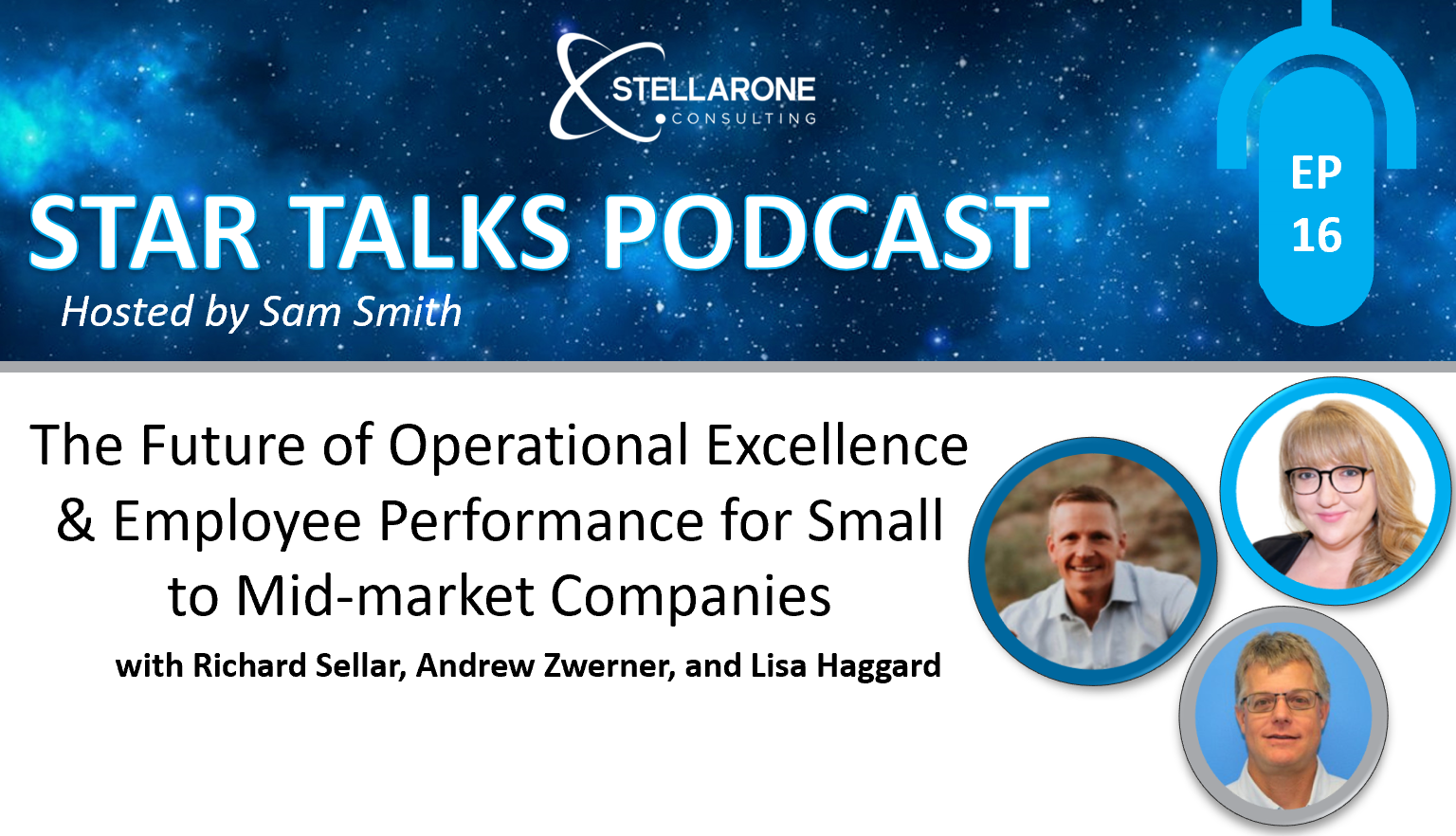Star Talks: Episode 5 with Lawrence Greaves: Star Talks is the podcast of small conversations that inspire you to do big things, and on this episode Lawrence Greaves, CEO and Co-Founder of Opkix, shares how the team assembled around you is key to being a successful entrepreneur.
In this episode of Star Talks, Lawrence Greaves sits down with us to talk about:
- How he was introduced to an entrepreneurial lifestyle at a young age
- Being a successful entrepreneur isn't about personal gain but rather the team assembled around you
- Breaking down the glamours ideals of being an entrepreneur by sharing his determination, hard work and countless hours it took to start the company, Opkix.
Duration: 00:27:00 | Recorded: July 8th, 2019
Ways to connect with Lawrence and the Stellar One Team:
Lawrence Greaves - LinkedIn | Website: Opkix
Podcast Episode Links - Apple Podcasts | Google Play | SoundCloud | Stitcher | Spotify
See all Episodes here - Star Talks Podcast
Stellar One Consulting Social Media - Facebook | LinkedIn | Twitter
Here's the episode transcript:
Lawrence, thank you so much for joining the show.
Lawrence: (01:11)
Thanks Sam. Uh, my pleasure and I appreciate the opportunity.
Lawrence, you're a really interesting guy. Walk me through your childhood. What was it like growing up?
Lawrence: (01:18)
Yeah, so I was born in England in a tiny village with about 600 people. Uh, my graduating class from my, um, my, my first school was about 32 kids. Uh, so really rural England, um, and had an incredible, uh, you know, start in life, uh, mother and father, a great oldest sister. Um, that gave me every opportunity and experience that a young man could have. Uh, my dad was an entrepreneur, so we had the blessing of traveling the world from a very young age. In fact, so much so that my mother, who's South African, um, my family actually moved us to South Africa when I was about 11 years old. And I stayed there till I was about 16. Um, where I went to school, played rugby, and had an incredible time and I actually moved back to England to the same house that we had grown up in.
Lawrence: (02:06)
Um, which very much felt like a vortex. Everything was the same five years later on, same conversation, same dialogue, same speed. So when I got the opportunity to go to college in London, I jumped at the chance. Um, so I actually moved from a really, really small community to just one of the biggest, um, you know, metropolitan cities in the world, uh, where I went through, um, a business undergrad, which I did not finish, but had just an incredible opportunity in learning. Um, and, uh, also, uh, during that time I spent the gift back in South Africa about back in South Africa again when I was around 21 years old. Um, and finally when I moved back to London, I then met the love of my life, a girl from Southern California, um, who, uh, we did a long distance dating relationship for about nine months. And then, um, both made the decision that we would come back to, to, um, uh, here in Southern California and I permanently moved to America in may of 2005 where really the bulk of my business journey begun.
So walk me through, you know, your first signs of being an entrepreneur.
Lawrence: (03:12)
Yeah, I think that was about eight years old. Um, so growing up in an entrepreneurial household, we never had the soul or discussion of a job. Um, you know, when I was in college or when I was growing up, I did a range of, of, uh, jobs that, that you'll, you'll find teenagers doing. In fact, I was in the McDonald's at one point, um, which, you know, a lot of my friends and family find comical. Uh, but from my standpoint, it was a way to make money and free myself and do the things that I love to do, which was always traveling. Um, and you know, just in terms of always wanting to be, you know, at the best that I could possibly be, whether that's an overachiever or just someone who's committed to, you know, uh, always the strongest output. You know, I actually was able to get myself to be a 16 year old, 17 year old in McDonald's and promoted to have an opportunity to be a manager that by the time I was 18, uh, which of course I didn't take, but it was just really a fun thing.
Lawrence: (04:05)
And I always shed the joke of, uh, working in McDonald's actually won an award while I was that for being the only employee to have received multiple tips on people's bills, but people would actually leave that change behind to thank me for the service. And I kind of gives you a, a bit of an idea and a background in terms of trying to be as humble as I possibly can in anything that I do, um, to be the best that I can, which really served me well later in life when I moved into being an entrepreneur.
This is a recurring theme that I hear with entrepreneurs is this concept of humility. Why is humility so important to the entrepreneur and why is it play such a key role in success?
Lawrence: (04:44)
I think that the world has an ability of reckoning and humbling. Those that don't do it themselves. Um, so most of the experiences that I've learned or gained have been through things that either I have done wrong or could have done better. Um, so you know, humble yourself or you will be humbled. Um, so I think it's just a logical step to do that. So that's, and quite frankly, when you're looking at becoming an entrepreneur, you realize that it's never about your own personal production, but it's about the team that you can assemble around you. Uh, I feel like empowering other leaders and other entrepreneurs has been my life's mission and journey. So it's never just been about my own personal wealth creation or success or accolades. It's been about empowering people around me to do that. And I think that you'll find that in a lot of cases. Um, you know, great businesses, uh, led by people who have the ability to give up secret sauce and share it and inspire and grow other individuals, uh, as well as themselves at the same time.
So you went to college, so a lot of entrepreneurs have a love hate relationship with higher education. What was your college experience like?
Lawrence: (05:53)
My college experience was incredible. Uh, quite honestly. I mean, again, I was in the middle of London, so, you know, I think I ended up having more fun than I did learning. Um, you know, certainly in the areas that, that I provided in, in kind of the, the entry point of the universe feel the different, um, you know, core competencies that I was studying. Uh, you know, I always had a, you know, very strong grades in the areas that I was not interested in. Uh, I would either not participate at all in the classes or fail them dramatically. So I, I'm very binary. Um, and uh, you know, everything in my life is black and white. I either put everything I've got into it or I can almost pay no attention to it whatsoever. And college was exactly that. Um, so, you know, my college experience was great and I would tell everyone who listens to these interviews as well.
Lawrence: (06:40)
I'm not an advocate of anyone dropping out of college or not going that path. And I think when I get, you know, the, the, the comparisons of Zuckerberg and Gates and Steve jobs, who, who did drop out of college, I'm going to build great technology businesses. I don't think that was the case with me whatsoever. I was so enthusiastic to get out into the, to the workplace. Um, and yeah, and I've just been fascinated by business since such a young age. And I think it was partly my arrogance, a feeling that I was already smart enough to go out and do things on my own. So I would tell people that the next 15 years or so me building and selling companies was both my undergrad masters and a PhD and everything on how not to do things, which I probably could have saved myself a lot of time, but I just finished the last year and a half of my, uh, university.
Lawrence: (07:31)
Um, but you know, again, if it works well for me and that con advocate enough that, that, that that is not going to be the case for everyone else. You know, you've always got to understand your own skills, uh, weaknesses. And again, for me, my entrepreneurship is very much DNA based. So I was born with a very limited but, but valuable set of skills. And I just try and stick to those as much as possible and either avoid the ones that I don't have or hire brilliant people that do have them and surround myself with folks that can do things that I can't possibly think of doing.
So once you're done with college, what do you do next? What's your first move?
Lawrence: (08:08)
So I ended up working for a very large, uh, financial services company, um, that, uh, cause I investment bank and lending out, learning how to either, um, provide capital or do deal structures for acquisitions, dispositions, emojis. Um, and frankly that was really the only job that I ever had. So I did a lot of studying in business management, um, post colleges, uh, post-college, um, with Royal bank of Scotland where I got a lot of additional sets of cations on, on how the fundamentals of of business transactions worked. Um, and again, after about a year or a year and a half in that field is when I had met my then girlfriend, now wife who's a Southern California resident. Uh, she was finishing her studies in London. We met and decided to parlay that back into moving to the U S where, um, I ended up taking those skills and interviewing and moved into the next chapter of my life here in America in 2005.
So once you got settled in Southern California, what'd you do? Start a consulting practice?
Lawrence: (09:14)
Yeah, so actually there's a step prior to that. So I actually was interviewed by a, um, a, uh, a financial, uh, financial services practice here in, uh, in California where they were looking to help find me a job. Um, and by the end of the first interview, I had all three partners of that firm on the phone, actually offering me a job to come in and help sell professional services with them. Um, so I actually didn't have any legal paperwork to live out here. My wife and I were actually going through getting married at the time. Um, so I actually interned for free for six months and learned that business and quite quickly what's out that, you know, not only was I the, the top performer in that environment, but, uh, I was also learning a trade in a new part of the world and getting familiarized with local business cultures and practice.
Lawrence: (10:04)
And, um, it was a tremendous launch pad for what was next for me, which was actually separating from that business and myself and one other guy, uh, did actually, uh, create, uh, our own version of the same firm, which was acquired pretty quickly thereafter by a very large national consulting firm. So I went from internship to, uh, you know, jumping out the limb on the first entrepreneurial journey at 22 years old to be, um, you know, uh, quiet and then placed on a leadership team of a very large and very well known consulting firm by the age, uh, which was pretty incredible. I think the average age of the leadership team and the management team of the, uh, the company in reference, it was about 61 years old. So it was a pretty incredible departure of, uh, you know, all the sleeping on couches and working for free and cold calling, 14 to 15 hours a day and all of a sudden the journey began and what we built turned into an incredible two and a half years that I've spent with the business.
Lawrence: (11:05)
And we help grow the firm from a $65 million a year revenue business to a $230 million a year revenue business within two and a half short years. And, um, I had, uh, know tremendous financial upside from that growth, tremendous learning and leadership, uh, opportunities where I was frequently the lead speaker, uh, for the company on growth and, and, uh, it was incredible. Um, and you know, that that led into my, my next journey, which was saucing my own professional service firm, uh, at the ripe old age of 25, um, which I funded and launched with one of the partner. We remain 50, 50 partners for eight and a half years. We built out a very large national consulting practice with, uh, we opened seven offices and hired over 800 stuff and remain held until the day that I sold the company in 2017. And it was over the course of those years that I really blossomed into being a true entrepreneur, building, managing, retaining stuff.
Lawrence: (12:03)
Um, and then I, myself as the co founder of the company, found myself in some pretty incredible positions where I actually got, uh, placed on boards of some of the companies that we represented and help several of them go through very large transactions. Um, one of them being beats by Dre, the headphones company. Hmm. Um, uh, I've built out just this incredible roster of clients that were paying me to advise them, uh, you know, in my mid twenties getting lean, uh, equity positions in businesses before they were sold. And, um, quite frankly realized that by about 2015, um, that, you know, my excitement and my drive was actually coming around, uh, to, to being an invest in myself, uh, which is when I stopped it actually actively investing in and really promising tech businesses. Um, so over the course of 2015, 16 and then completing the transaction in 2017, I sold my 50% share of the company that I'd created over an eight year period and moved full time into, uh, investing, uh, and board level advisory work, which I've been doing actively now since, uh, 2015.
Wow, that's incredible. How do you take a company that's doing $63 million in revenue to over $200 million in revenue?
Lawrence: (14:29)
Sell, sell, sell, sell, sell. Um, I am, if I was describing myself in one word, I'm relentless again compared to some of the other entrepreneurs that we mentioned earlier in the school that dropped out of college. I don't have a 160 IQ and, and sit at my desk, you know, coming up with incredible algorithms and codes. Uh, but I do have the ability to increase revenue rapidly, uh, to study, manage and modify management teams and companies to make them perform at their best. Um, and I think I realized that I didn't really just want to be a guy that helped advise on transactions. Um, I want it to be the guy that led the transactions, is a seated CEO and of all the companies that I'd invest it in, the, the, the most promising business and opportunity that, that I had found or experienced in 15 years of being here and being surrounded by truly some of the most incredible businesses in, in American history over the last 15 years. Um, I, I saw an opportunity to actually provide the seed capital for a company called optics in 2016. Um, and after I'd sold my last business and, uh, kind of contemplated the idea of retirement at 33 years old, I realized that I can't sit still for more than about two minutes without going crazy. Um, so with my wife and my two children's permission and grace, I was able to actually not only invest in this company, but step on board as the cofounder and CEO, which I've now been doing for almost three years.
So tell us about what you're doing now. Tell us about Opkix.
Lawrence: (16:03)
So Opkix is without question one of the more exciting businesses that I've had the opportunity to see and be fundamentally part of its growth. Um, the initial idea, uh, from an inception standpoint came in 2016 when my business partner Shaheen, uh, who's an avid snowboarder, was on the side of a mountain in mammoth here in California and was frustrated with his action sports wearable camera, which was ugly and didn't perform well. And his backup option was, was snowboarding with a phone in front of his face would seem to be the way that so many people in this world were capturing content. Then he said, there's gotta be a better way to do this. There's gotta be something that's aesthetically pleasing, that superior from a technology standpoint that looks cool and is game changing. Um, so when we had met the initial idea was a very small wearable camera and we've modified the original idea to become Opkix and what Opkix is, it's the world's smallest, smartest and best looking wearable video cameras for a generation of content creators is we designed it to be fashion forward to fit a lifestyle demographic of people that are conscious about how they look while they're wearing technology.
Lawrence: (17:20)
And it's really two incredibly small wearable video cameras that plug into a wireless charged carry case that looks a lot like your Airpods carry case. We call it a case, the egg with the two cameras inside of it. And they Mount across our range of lifestyle accessories, which are Italian made eyewear, baseball hats, necklaces bring mounts and selfie sticks, all of which are cameras seamlessly, magnetically mounts to, uh, so you can capture the moments you live in, but live in those moments that you're capturing. Uh, and that's what we created with Opkix. All the content that, that we capture on these devices streams into your smartphone, into our video editing app so you can get back on the screen later that evening when you're home or whenever you finish playing around to create the best edit inside of a video editing app, add music, filters, emojis, augmented reality, and then post it anywhere online where we're, uh, we're open, uh, open source in terms of why you share the content. We just want to make sure that you capture it, record it, and play it out online.
Wow. So what's the difference between Opkix and say another action sports camera like GoPro?
Lawrence: (18:31)
Yeah, that's a, a pretty stuck differentiator. And I would tell you that what GoPro did so well what's focused on creating action sports wearable cameras where they didn't, they focus more on a rugged device. They didn't care how much, how it looks, which is evident in the way that the camera's designed. Uh, and the way in which you have to mount that camera. It's very cumbersome that lots of other plastic boxes and you have to have screws and helmets. And frankly, I think that, you know, what they created was for a generation of, of companies that were coming up in the two thousands in the action sports market. Um, they were providing a great documentation tool for those action sports. Well, what we're focusing on is something completely differently. So the comparison ends with the fact that they make a camera and we make a camera.
Lawrence: (19:18)
We're about one eighth of the size and one 11th of the weight, absolutely vivid video quality, high quality, um, surround sound audio. And again, you can have a device magnetized to the side of your eyewear and jumped in the pool and splash around and enjoy this, uh, bolster resistant features right out of the box. Um, and, and again, it's so small, so fashion forward and so easy to mount with focus on lifestyle. So it's oldest stuff you're doing when you're not bombing down the mountain on your snowboard. So back the initial inception, we started moving to this phase, like both Shaheen and I, uh, you know, um, in marriages with children and what capturing our kids first steps. Now, uh, you know, he and his wife, I've got great videos pushing the kids on the swing. For me, it's going down both the slides with my kids on the weekend.
Lawrence: (20:07)
And it's the ability to put a phone down and not have to stare through a screen and put a block between you and your subject. So we're actually giving upsells and the people who buy our products, the ability to actually live in moments that they're capturing. Um, so they're remembering these experiences firsthand and enjoying the playback whenever they, you know, they get home and they crash on a couch so they can check all the video and feedback like the um, but they'll have remembered the event and documented it at the same time. So for us it's lifestyle. So it's concerts, it's going to theme parks, it's going on runs, it's Pilates classes. It's um, pushing kids on swings. It's really focused on lifestyle. I think most people now look at videos as the platform in which they're going to document their lives going forward. We just want to give them the ability to put that smart phone down.
That's really powerful. Coincidentally enough, I was actually up in mammoth lakes a week before last and you know, we were walking around the lakes and in the mountains and my wife was recording everything using her phone and I was thinking, wow, wouldn't it be cool if she didn't have to be holding the phone the whole time? And it sounds to me like Opkix solves this problem. So you launched this brand this year, right?
Lawrence: (21:25)
Selling direct to consumer head. Just recently and at the tail end of the summer, we're actually starting to gear up a, I actually fly to Japan in two weeks for a very large press event. They're going to be the first international region that we're launching in, uh, July 26th. Um, and then we're going to be focusing on rolling the product out through Europe, parts of Asia, um, Australia, New Zealand, uh, seven countries in the EU. Um, so we're going to be making a very large push. We've really only been able to make very small batches of units so far. We're actually not only innovated the product here in orange County, California, um, we've raised money putting out valuations, the culture of $1 billion prior to the launch here in California, but we manufacture our products here, here in the United States, in orange County, California. So it's a pretty incredible journey. But as such, we're in a process, we're actually adding an additional factory that increased our production to keep up with demand as we start rolling out around the world.
Wow. So it sounds like you're going to be back in the position that you thrive in and sell, sell, sell.
Lawrence: (22:32)
I'm going to be put in a position where I get to do what I do best, which is inspire, grow and lead a team of some of the best and brightest minds I've been able to assemble. Um, you know, a lead engineer is, uh, got his undergrad, his master's and his PhD from MIT. Graduated top of his class. He's got a Guinness world record for smallest camera design. I've got a world class chief operations officer. We just hired the head of testing from one of our largest capacities to come on board and, and refine and continually improve the user experience through extensive beta testing. Um, we've, we've just hired a well class VP of marketing to focus on a message. Um, you know, we've got a team of 65 or so, some of the biggest celebrity ambassadors in the world who've actually invested in our company. Guys like Swae Lee, guys like Steve Howey, Mick fanning. Um, we've been truly blessed on every level by the people that surround me. So what I'm going to do is focus on what I do best, which is now grow and inspire and try and lead the brightest team of people that I've seen with the coolest product that I've seen in many, many years. So it's a culmination of a lot of blessings all in one place.
That's awesome, Lawrence. So what's the next move?
Lawrence: (23:44)
So the next for me is to try and sleep. Um, I gave, gave it up about nine months ago when we went into the tail end of up, I used to production, um, bringing this product to life was one of the largest challenges that any of us had ever, uh, lived through. I can give you the example of actually my chief operations officer for about a seven month period was going on three and four hours of sleep a night. In fact, many times would find them sleeping here at the offices that I had courses, which I never recommend or endorse for anyone. I think that trying to find some type of balance is more productive, which we've been able to give back to them now by stuffing up his department. But it has been the most intense labor of love. And just to give you an idea of what that looks like, we have 1,300 components inside the world's smallest cameras and a hardware that I described to you in the Opkix1 and such a small form factor. So the miniaturization that we've achieved in many cases, both are embedded flash memory of video processing, the battery life, literally it is game changing across so many permeations of the technology stack. Um, and it's taken over 200 engineers based on four continents, tens of thousands of hours, and almost $15 million worth of R and D efforts to get this product to market. Um, so my goal is now to take a deep breath as I prepare for the next journey, which is taking this incredible product and putting it all over the world so that everyone can have the ability to become less dependent on their smart phones going forward. But capture every one of life's most precious memories.
So last question, Lawrence and I always ask this of every guest, what's the most rewarding thing about you do?
Lawrence: (25:24)
I think the most rewarding thing about what I do specifically here at Opkix is the weekends that I just had, the July 4th week I had with my family where I actually didn't touch my phone in five days and the amount of content of my family and I was playing laughing, loving and living is without question the biggest gift that I could have ever given myself and my family, watching how my children react to me without a phone in my hand to be able to capture those moments. This is a gift that I want to give to as many people as possible and as quick a time as possible. Um, so my biggest rewards is actually being able to make the impossible, which is what we were told this product was from an engineering, the physics standpoint and making it possible.
Wow. It's been great to have you, Lawrence. Thank you so much for joining us.
Lawrence: (26:14)
Well, thank you so much. Honestly, I think it's amazing that you take the time, Sam, to do these things as well and just helping grow small and medium businesses. I love the fact that you love technology and uh, just really gracious. I love the questions that you've asked us so far and um, I, I hope we get a chance to do some more of these going forward and, and share the story as we continue to roll out.
If you'd like to suggest a guest, be a guest yourself, or if you have something you'd like to tell us, please send your message to StarTalks@StellarOneConsulting.com

